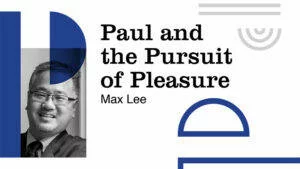“Fruit” and “Genesis” is a juxtaposition with a long and infamous history. It recalls a story passed on from generation to generation, connecting us to our ancestors, for good and for ill.
Fruit, in the first instance, is about fruitfulness. Originally, we are told, the earth was luscious and vivacious, teeming with flora and fauna. It was a place that God himself saw and called good. After creating man and woman, he gave them every plant on the face of the earth, every tree yielding fruit was good for food. Their appetites, we can imagine, were satisfied and their life and that of their descendants would have been good—in the fullest sense of the word.
But we are also told of other fruit, the fruit that grew on that one particular tree, whose singular presence stood out by the sheer fact that it was forbidden—the fruit that grew from the tree of the knowledge of good and evil. However exactly we might understand that tree,I want to re-esteem the intellectual world of the biblical literature and let its voice have primacy in this discussion in order to see what it can say. Scripture is clear on the consequences that came from eating it. An originally good life, a life of fullness and longevity, harmony and joy, was no longer good. Humanity was banished from the garden into a life of scarcity and toil, no longer at one with their environment, and their own “fruitfulness” was burdened by strife between husband and wife, parent and child.
This is the story we find in the opening chapters of Genesis. Dru Johnson, Associate Professor of Biblical and Theological Studies at The King’s College, is also interested in the “fruit” of Genesis, and that so in two senses. In his project, “Man Made: If Biblical Texts Could Speak to Modern Origins Stories,” he is both interested in the actual images, narrative, and concepts of biblical revelation (including fruit, talking serpents, and mystical trees), and he is advocating for what he calls an “apples-to-apples” approach to thinking about Scripture and questions of modern science. Says Johnson, “I want to re-esteem the intellectual world of the biblical literature and let its voice have primacy in this discussion in order to see what it can say.”
The Big Project: Recovering Scripture’s Intellectual Heritage
Johnson’s research project with the Creation Project is part of his larger agenda of rehabilitating the intellectual tradition within Scripture itself and in the Semitic intellectual world more generally. “I am amazed at how many Christian thinkers tacitly presume that real intellectualism begins in Greece and what we have in Scripture are a series of ‘cute tries’ at being intellectual,” Johnson comments. He believes that we’ve lost Scripture’s own habit of thought—the inherent connection between thinking and the concepts we employ, epistemology and ethics, the way that Scripture raises questions and goes about answering them.
This larger agenda of Johnson’s arises out of his prior work in psychology and epistemology. At one point, Johnson had considered an academic trajectory in psychology rather than theology. He’s never lost his interest in research design, statistical analysis, and scientific epistemology, even if he’s now also attending to these issues in conjunction with biblical theology and Semitic philosophy. In recent years, these labors have born much fruit. Johnson has published Biblical Knowing: An Epistemology of Error (Cascade, 2013), Scripture’s Knowing (Cascade, 2015), Epistemology and Biblical Theology (Routledge, 2017), and Rite to Know: The Biblical Nexus of Science, Ethics, and Sacraments (Eisenbrauns, 2018). He is also currently completing a manuscript titled, “Is There a Philosophy of Christian Scripture? Charting the Intellectual Waters of the Bible.”
Johnson’s biblical-theological thinking and epistemological questions have continued to bring him back to Genesis and creation. “It’s now difficult for me to think about theology without reconciling it through the biblical creation.” Biblical creation is about knowing, being wise and discerning people. His wider aims and scholarly and ecclesial endeavors accordingly led him to the Creation Project’s residential community and this project on Genesis, human origins, and modern science.
Finding Some New Fruit in the Garden
With this project in particular, Johnson is interested in considering issues of origins between Christian Scripture and modern, evolutionary science through what he calls an “apples-to-applies” approach. Often, the discussion is what he alternatively calls an “apples-to-oranges” approach.Conversely, by taking an apples-to-apples approach, Johnson is interested in looking for fertile ground where Scripture and the claims of science can be put more directly into conversation with one another. According to Johnson, “most scholars tend to think of the biblical creation account as doing something radically different than the aims of Darwin’s Origin of Species or evolutionary theory more generally.” Consequently, Scripture is too frequently set aside in our considerations of the empirically-based conclusions of modern science. Conversely, by taking an apples-to-apples approach, Johnson is interested in looking for fertile ground where Scripture and the claims of science can be put more directly into conversation with one another.
Johnson believes that he’s found such “apples” with three key concepts: scarcity, fittingness, and propagation. “I have a question about how novel Darwin’s discoveries actually were,” says Johnson. “By that, I mean I wonder if the three evolutionary pressures he identified haven’t been broadly understood throughout history as the general animal condition.” Indeed, these concepts already feature prominently in Genesis. On the one hand, Genesis begins by subverting the idea that these pressures are endemic to God’s good creation: food is lush, humans abide in their place, and propagation is plentiful. On the other hand, only chapters later, we witness the origin of sin, which subverts this original goodness: toil replaces lusciousness, exile replaces dwelling, and strife and infertility disrupts procreation.
All three of these concepts are central both to Darwin’s account of evolution and the biblical account of what it means to be human. Thinking about these concepts between Scripture and modern science is the way that Johnson is trying to refocus our attention in the garden and indeed “in the beginning.” This is Johnson’s apples-to-apples approach. “I’m genuinely unsure of how the conversation will turn out, but I would like to put the Semitic creation story in direct contact with the current scientific creation stories.”
A Community of Discourse
In semi-recent epistemological developments, there has also been an increasing recognition that knowledge is socially located. Minimally, that means that we think together, and our epistemic confidence is always located within a community of belief. This is no less true in science than any other community of discourse and understanding. Knowledge is developed through rituals and faith-practices, and it is preserved through them. A more complicated question is why certain theories become accepted and established and what discredits them. One intriguing question that Johnson has asked: “In what ways does the scientific community resemble Christian community?”
However we answer that question, what is undeniably clear is that Johnson will be thinking in Christian community and with Christians in the sciences . . . at least for the fall of 2018 at the Henry Center. “I’m most looking forward to better understanding the history of the conceptual development of evolution and some of the nitty-gritty details from the empirical basis for it,” says Johnson. “I want to learn just about everything I can in the time allowed.” As he delves into evolutionary theory, as well as listens to and learns from scientists, he will also have his own place and voice in the community.
“Oh, taste and see that the LORD is good” (Ps. 34:8). In tending the garden of Scripture, Johnson hopes to satiate all our appetites on the inner-biblical coherence of Scripture.
2018–19 Henry Resident Fellows
2018–19 Henry Fellows Announced | Learn More
James Hoffmeier, “Why We Believe in Creation & Evolution: A Discussion between an Evolutionary Biologist & an Old Testament Scholar” | Learn More
Fred Sanders, “The Doctrine of Humanity in Systematic Perspective” | Learn More
Dru Johnson, “Man Made: If Biblical Texts Could Speak to Modern Origins Stories”
Ryan Peterson, “Human Identity in Theological Anthropology” | Learn More
Mary VandenBerg, “Retrieving a Substantialist Understanding of the Image of God” | Learn More
Ralph Stearley, “Assessing Evidences for Cognitive Capacities in Ancient Hominins, with Reference to their Perception of God” | Learn More
Joshua Farris, “The Soul of Science and Religion: Theological Anthropology, Substance Dualism, and Origins” | Learn More







Comments
Be the first one to make a comment!